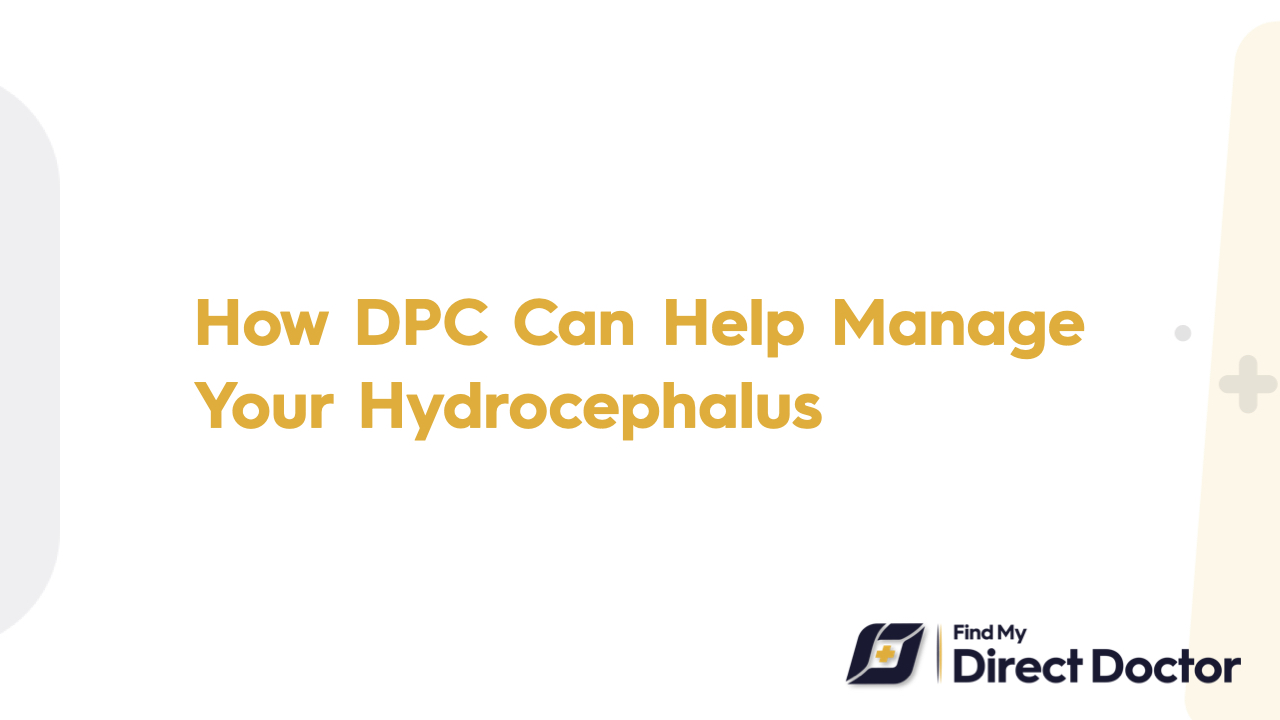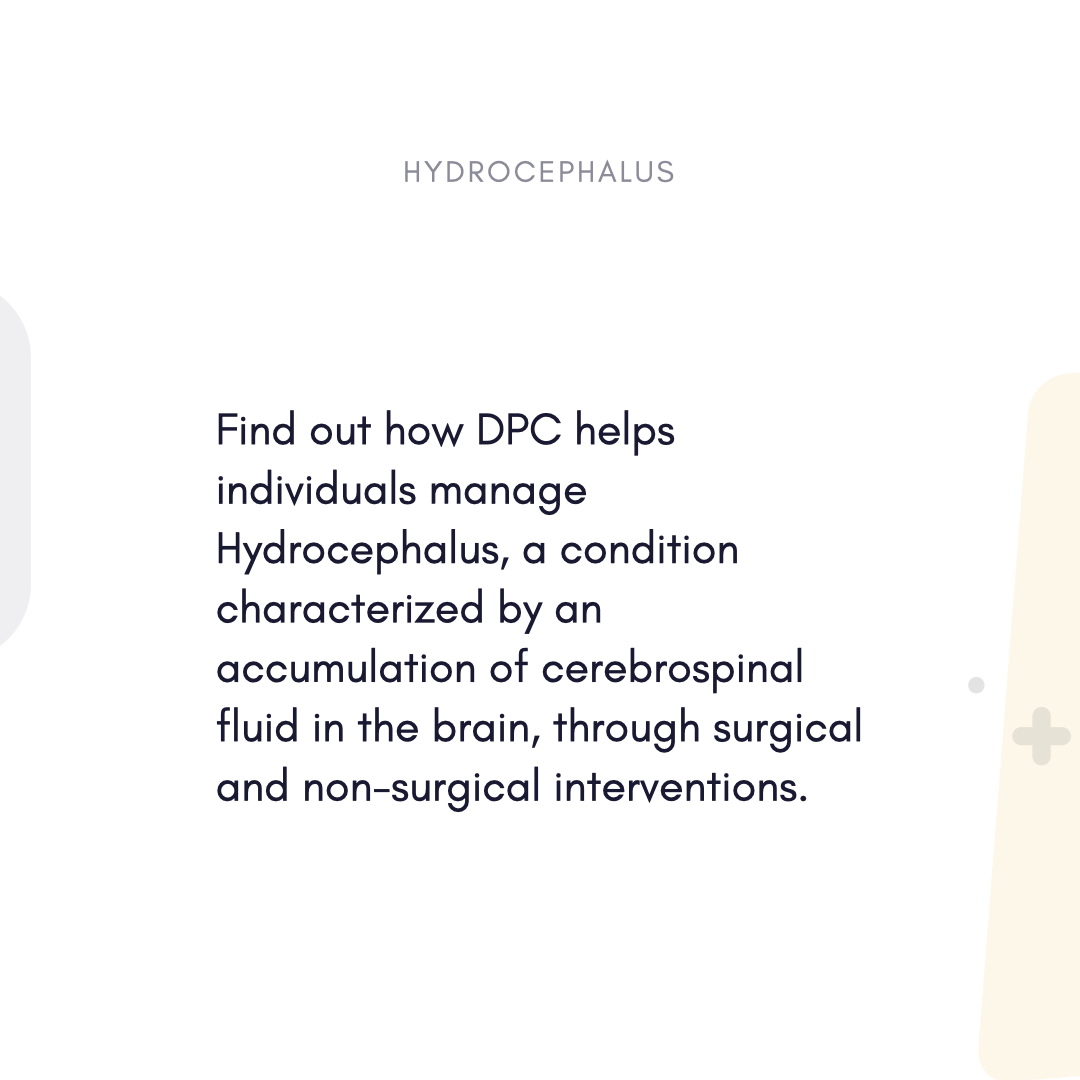Hydrocephalus and Direct Primary Care (DPC): Your Path to Coordinated, Compassionate Care
Often known as "water on the brain," hydrocephalus is a complicated disorder in which extra cerebrosporal fluid (CSF) builds up in the skull, so raising brain pressure. Whether congenital or acquired—that is, from injury, infection, or stroke—managing hydrocephalus calls for lifetime awareness, regular imaging, and often surgical intervention. The scattered approach of traditional healthcare can overwhelm families and individuals. Affordable, patient-centered care that crosses neurology, neurosurgery, and daily wellness provides a better approach from Direct Primary Care (DPC). Let's see how DPC helps hydrocephalus sufferers negotiate this difficult path.

Appreciating Hydrocephalus
When CSF production exceeds absorption, hydrocephalus results and dangerous pressure on brain tissue results. Important obstacles consist:
- Headaches, nausea, vision changes, cognitive decline, or gait abnormalities define symptoms.
- Surgical needs call for either endoscopic third ventriculostomy (ETV) or shunt placement.
- Complications include revisions, infections, or shunt failures.
- Constant monitoring includes neurological tests, MRIs and CT scans.
- Managing crises—such as sudden shunt failure—helps to reduce caregiver stress.
- Preventing brain damage depends critically on early identification and consistent treatment.
DPC Transforms Hydrocephalus Control
Under the membership approach known as Direct Primary Care (DPC), patients pay a monthly fee—usually USD 50–USD 150—for unlimited access to their doctor. For those with hydrocephalus, this translates into no hurried visits, no surprise bills, and a care team focused on your emotional and neurological needs.
Customized, Ongoing Attention
DPC physicians provide according to Hydrocephalus Association recommendations, following:
- Survey of symptoms: Using patient-reported outcomes (PROs), track headaches, vomiting, or behavioral changes to customize treatment.
- Care coordination: Working with neurosurgeons to plan shunt changes and timely imaging (such as CT scans).
- Emergency readiness: Same-day visits for urgent problems including shunt failures.
- Through therapy referrals, mental health integration addresses anxiety, depression, or caregiver burnout.
Fair, Transparent Treatment
Using wholesale-priced imaging, DPC clinics help to lower financial burden:
- Discounted MRIs/CTs at affiliated hospitals.
- Cost-effective control: By means of proactive monitoring, avoid needless ER trips.
- Clear prices for tests, wound checks, or lab work—no hidden fees.
Comprehensive Support for Every Phase
Having 24/7 access to your doctor allows you to:
- Quickly discuss new symptoms (such as sudden headaches).
- Go over scan findings without waiting weeks for specialist visits.
- Plan post-operative treatment following ETV or shunt revisions.
Individualized Hydrocephalus Management in DPC
DPC develops plans specifically for your situation. Not one-size-fits-all is hydrocephalus treatment:
- Pediatric focus: Tracking developmental milestones in kids with congenital hydrocephalus.
- Older adults managing comorbidities like dementia or mobility problems alongside shunt treatment.
- Patient-centered tools: Tracking symptoms and real-time care adjustments made using PROs.
- Integrated care teams make sure therapists, rehab experts, and neurosurgeons all communicate seamlessly.
Real-Life Success Stories
- Case 1: In two years, Liam, six (congenital hydrocephalus), underwent three shunt changes. His DPC physician observed a pattern whereby seasonal infections caused malfunction. Liam avoided another revision for eighteen months by ordering prophylactic antibiotics and working with his neurosurgeon.
- Case 2: Evelyn, 58, had hydrocephalus following a stroke. Her DPC doctor changed her diuretics, linked her with a neuro-rehab specialist, and scheduled same-day CT scans during headache flares. Evelyn's cognitive ability settled and she started to feel independent.
Frequently Asked Questions: DPC and Hydrocephalus
- Q: Can DPC handle situations involving shunts?
A: DPC guarantees quick triage—coordinating ER visits or neurosurgery referrals right away.
- Q: For lifelong hydrocephalus treatment, is DPC reasonably priced?
A: Certainly! Most families avoid unnecessary ER visits, save on imaging and specialist co-pays. Usually, memberships are less than a phone plan.
- Q: Should I call a neurosurgeon?
A: Your DPC doctor guarantees consistent treatment by easily sharing records and handling referrals.
Why DPC Wins for Hydrocephalus Patients
DPC follows Hydrocephalus Association recommendations to directly close the gaps in conventional treatment:
- Same-day visits for symptom flares help to prevent crises.
- Continuity: A reliable source tracking your shunt history and comorbidities.
- Using tools for patient empowerment, PROs and education help you make decisions about your care.
- Cut costs with discounted imaging and no surprise bills.
Take Charge of Your Hydrocephalus Journey Today
Though relentless, hydrocephalus is not something you have to deal with by yourself. DPC helps you find a partner who combines medical knowledge with relentless support, so enabling you to preserve brain function and recover quality of life.
- Customized care plans changing with your requirements.
- Financial clarity will help to lower anxiety.






